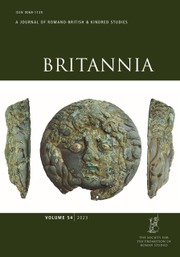Article contents
The Haverfield Bequest, 1921–2000, and the Study of Roman Britain
Published online by Cambridge University Press: 09 November 2011
Extract
Francis Haverfield, the acknowledged master of modern study of Roman Britain, died in 1919 at the age of fifty-nine after a twelve-year tenure of the Camden Chair of Ancient History at Oxford and an Oxford career which had begun in 1892 with a Senior Studentship of Christ Church. Under the terms of his will a substantial bequest was made to Oxford University in support of research on Roman Britain, a subject which he had done much to place upon a secure academic footing before 1914, most notably by the more detailed study of inscriptions. In 1921 the University brought together a group of scholars who would serve as Administrators of the Haverfield Bequest, their duties being to develop policy for the direct use of its funds and to receive applications from other bodies and individuals. It was Haverfield's express wish that a prime and particular objective of the Bequest would be the production of a corpus of Roman inscriptions in Britain. This has been a central concern of the Administrators from the beginning and this remains the case today.
- Type
- Articles
- Information
- Copyright
- Copyright © Malcolm Todd 2003. Exclusive Licence to Publish: The Society for the Promotion of Roman Studies
References
1 i.e. the Faculty which embraces Classical Languages and Literature, Ancient History and Philosophy.
2 This has been overtaken by events, since there is now only one exclusively women's college in Oxford (St Hilda's). The Bequest has not supported a lectureship though it has provided, and still provides, remuneration for other posts on a short-term basis.
3 Professor Frere continued his work for the Bequest and acted as Chairman from 1989 to 1995.
4 Directed by Professor M.G. Fulford.
5 Directed by Professor M. Todd.
6 This paper was stimulated by and is based upon an index to the Minute Book of the Haverfield Bequest, compiled by the writer in 2001/2, by courtesy of the Administrators. The Minute Book is held by the Camden Professor, Professor A.K. Bowman, at Brasenose College, Oxford. Chairman of the Administrators.
- 2
- Cited by




